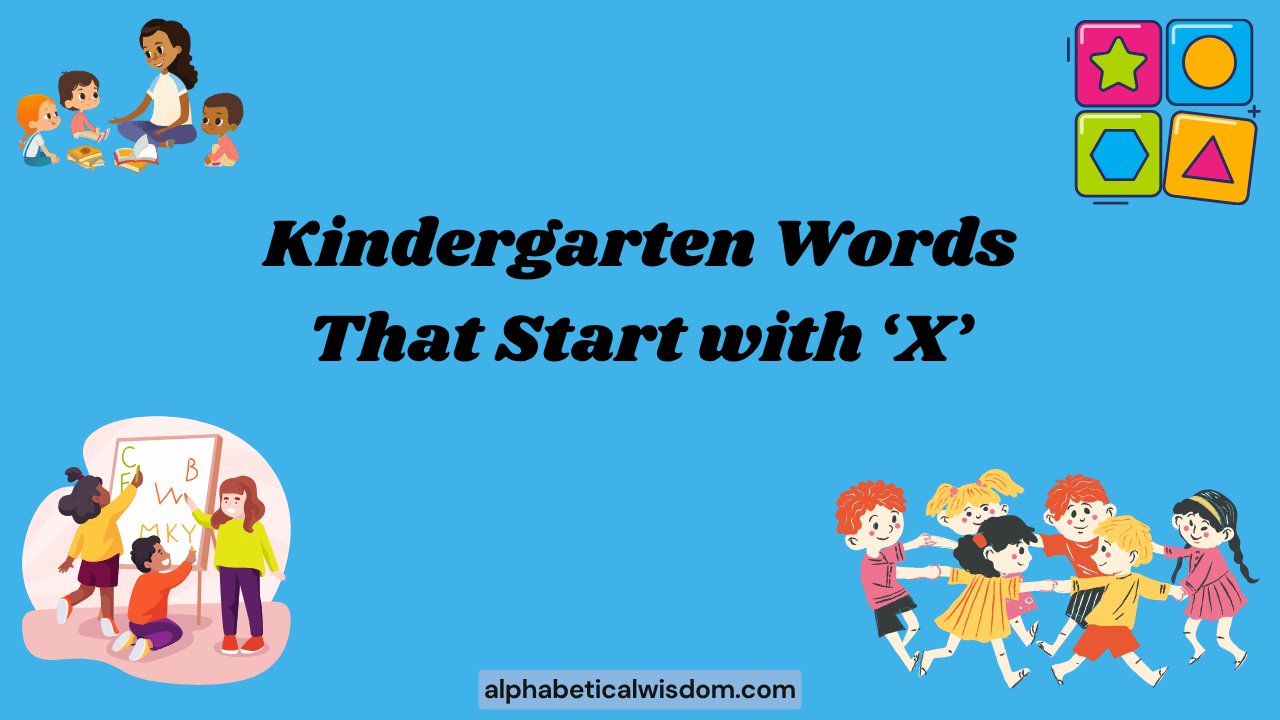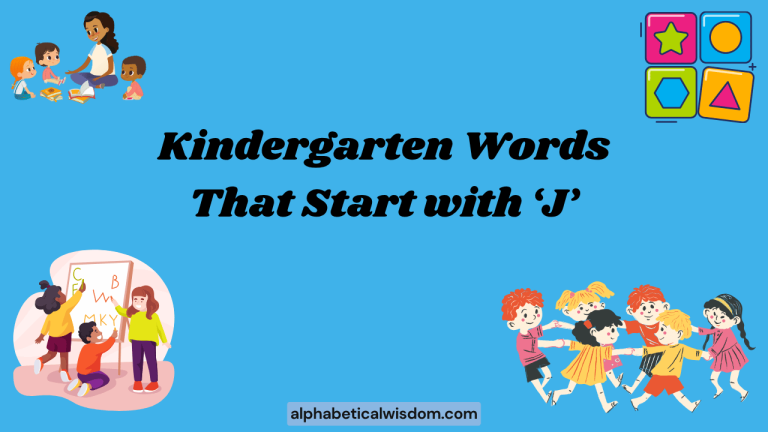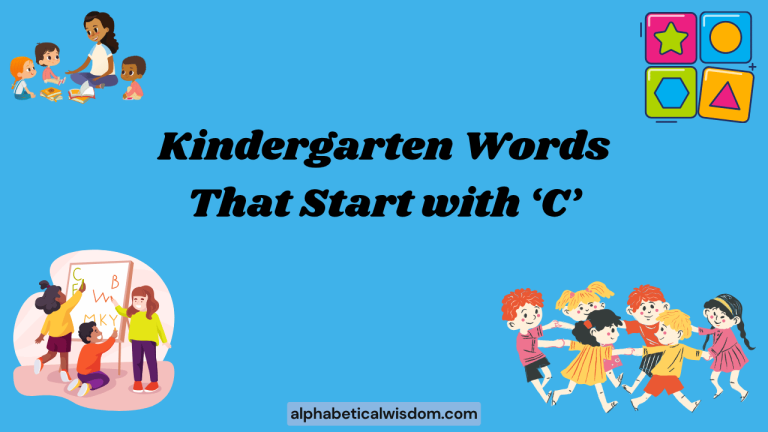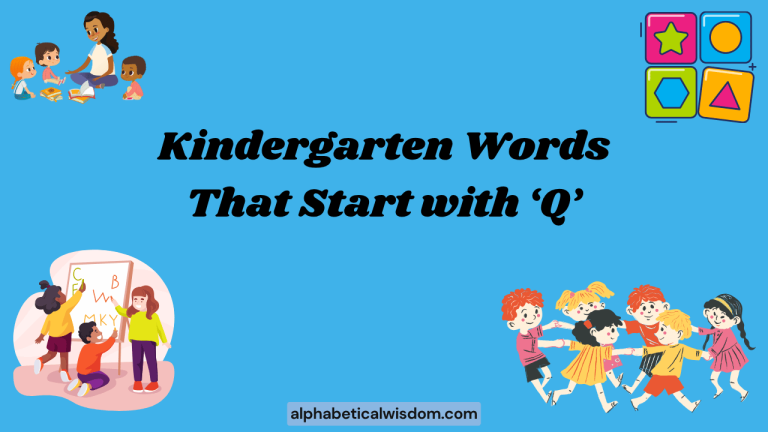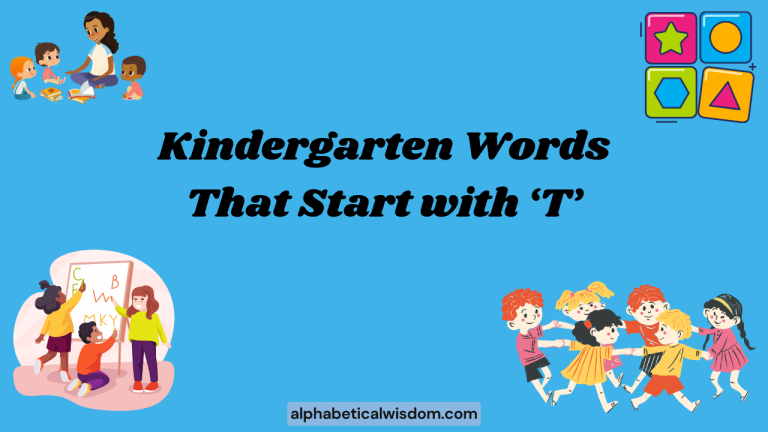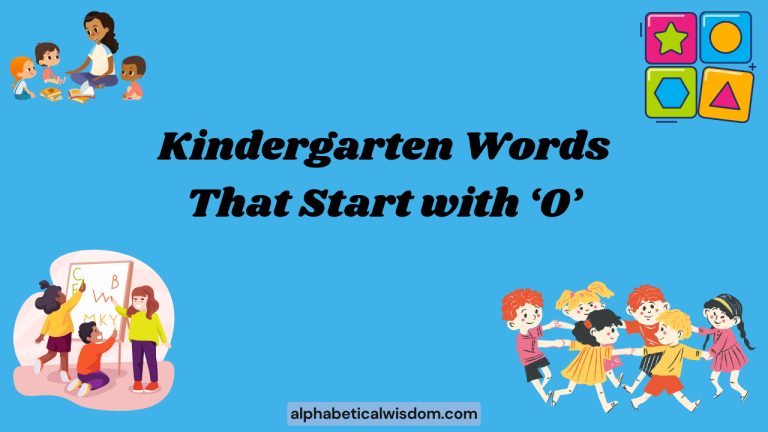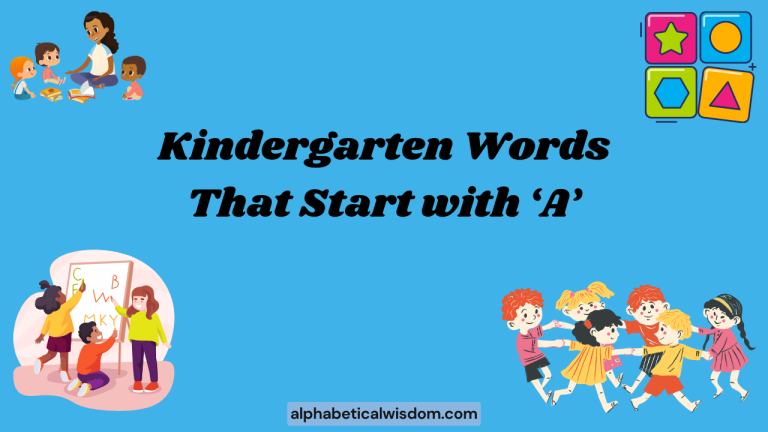Kindergarten Words: Exploring Words That Start With X
Learning the alphabet is a fundamental step in a child’s education, and mastering words that begin with each letter is crucial for building a strong vocabulary. While some letters have an abundance of words, others, like “X,” present a unique challenge.
This article focuses on kindergarten-appropriate words that start with “X,” providing definitions, examples, and engaging activities to help young learners expand their linguistic skills. Understanding these words not only enhances vocabulary but also improves reading comprehension and overall language proficiency, setting a solid foundation for future academic success.
This guide is perfect for parents, teachers, and anyone involved in early childhood education.
Table of Contents
- Introduction
- Definition: Kindergarten Words Starting with X
- Structural Breakdown
- Types and Categories of ‘X’ Words
- Examples of Kindergarten Words Starting with X
- Usage Rules for Words Starting with X
- Common Mistakes When Using ‘X’ Words
- Practice Exercises
- Advanced Topics: Expanding Vocabulary
- Frequently Asked Questions (FAQ)
- Conclusion
Definition: Kindergarten Words Starting with X
Kindergarten words that start with the letter ‘X’ are terms suitable for young children typically aged 5-6 years. These words are usually simple, easily pronounceable, and often related to common objects, actions, or concepts familiar to them.
Given that ‘X’ is a relatively uncommon initial letter in English, the vocabulary is limited, but it’s essential to introduce these words to ensure a comprehensive understanding of the alphabet. The primary function of learning these words is to enhance phonemic awareness, vocabulary acquisition, and early reading skills.
In the context of kindergarten, ‘X’ words often appear in phonics lessons, vocabulary-building exercises, and simple reading materials.
The words are generally nouns, verbs, or adjectives that are easy to grasp and relevant to a child’s everyday experiences. For instance, “xylophone” is a common noun that refers to a musical instrument, while “X-ray” is a noun often associated with medical procedures.
The goal is to make learning engaging and memorable, fostering a positive attitude towards language learning. Using visual aids, interactive games, and real-life examples can significantly improve retention and comprehension.
Introducing these words within a structured curriculum helps children build a strong foundation in literacy, preparing them for more advanced concepts in later grades.
Structural Breakdown
Understanding the structure of words that begin with ‘X’ can be quite straightforward, although the letter itself can be phonetically complex. Here’s a breakdown of the structural elements and patterns commonly found in these words:
- Phonetics: The letter ‘X’ can represent different sounds depending on its position in a word. At the beginning of a word, it’s typically pronounced as /z/ (as in xylophone). In other positions, it often represents the /ks/ sound (as in box). However, for kindergarten words starting with ‘X’, it almost always has the /z/ sound.
- Syllable Structure: Kindergarten words are often monosyllabic or disyllabic, making them easier for young children to pronounce and remember. For instance, X-ray has two syllables, while some other related words might be longer but are less common in early education.
- Morphology: Many ‘X’ words are simple root words without complex prefixes or suffixes. This simplicity aids in comprehension and memorization. Examples include Xmas (short for Christmas) or X-ray.
- Common Patterns: A common pattern involves ‘X’ followed by a vowel, which usually dictates the /z/ pronunciation at the beginning of the word. This pattern is evident in words like xylophone and X-ray.
By focusing on these structural elements, educators can help children decode and understand new words more effectively. Breaking down words into their phonetic and morphological components allows for a more systematic and engaging learning experience, reinforcing the connection between letters, sounds, and meanings.
Incorporating visual aids and auditory cues further supports this structural understanding, making the learning process more intuitive and accessible for young learners.
Types and Categories of ‘X’ Words
When teaching kindergarten words that start with ‘X’, it’s helpful to categorize them based on their usage and meaning. This approach allows for a more structured and comprehensive understanding.
Here are some key categories:
Nouns
Nouns represent objects, places, or things. Words like “xylophone” and “X-ray” fall into this category.
These words are tangible or represent tangible concepts that children can easily relate to.
Abstract Concepts
While less common, some abstract concepts can be introduced. For example, “X marks the spot” can introduce the idea of a location.
These concepts require a bit more explanation and contextualization.
Compound Words
Compound words, such as “X-ray,” are formed by combining two or more words. Understanding compound words enhances vocabulary and reading skills.
Examples of Kindergarten Words Starting with X
Providing concrete examples is crucial for helping kindergarteners grasp new vocabulary. Here are several examples of words that start with ‘X’, categorized for clarity and ease of learning.
Objects
Objects are tangible things that children can see and interact with. Using real-world objects or pictures can greatly enhance understanding.
The table below presents a list of object-related words starting with ‘X’ suitable for kindergarteners.
| Word | Definition | Example Sentence |
|---|---|---|
| Xylophone | A musical instrument with wooden bars that are struck with mallets. | The child played a tune on the xylophone. |
| X-ray | A type of electromagnetic radiation used to create images of the inside of the body. | The doctor took an X-ray of my broken arm. |
| Xmas | A common abbreviation for Christmas. | We decorate the tree for Xmas every year. |
| Xenops | A type of bird found in Central and South America. | The birder spotted an elusive xenops in the rainforest. |
| Xeric Garden | A garden designed to survive with minimal irrigation. | The xeric garden was full of cacti and succulents. |
| Xmas Card | A greeting card sent during the Christmas season. | She received many Xmas cards from friends and family. |
| X-height | The height of lowercase letters excluding ascenders and descenders. | The font’s x-height made it easy to read. |
| X-axis | The horizontal axis in a coordinate system. | The graph showed the data points along the x-axis. |
| X-chromosome | A sex chromosome in mammals. | Females have two X-chromosomes. |
| X-brace | A support structure in the shape of an X. | The bridge had strong x-braces. |
| X-acto knife | A precision knife used for crafting. | He carefully cut the paper with an X-acto knife. |
| X-file | A classified or unsolved case file. | The detective reopened the old x-file. |
| X-factor | A notable special talent or quality. | Her performance had that special x-factor. |
| X-ray machine | A device that produces X-rays for medical imaging. | The patient lay down for the X-ray machine. |
| X-ray technician | A person trained to operate X-ray equipment. | The X-ray technician prepared the room for the scan. |
| X-wing | A type of fictional starfighter in Star Wars. | The rebel pilot flew an X-wing into battle. |
| X-band | A portion of the microwave radio region. | The radar operated in the X-band. |
| X-coordinate | The position along the x-axis. | The point had an x-coordinate of 5. |
| X-intercept | The point where a graph crosses the x-axis. | The x-intercept of the line was at x=2. |
| X-linked gene | A gene located on the X chromosome. | The trait was determined by an X-linked gene. |
| X-ray vision | The fictional ability to see through solid objects. | The superhero had X-ray vision. |
| X-men | A team of fictional superheroes with mutations. | The X-Men fought to protect humanity. |
| X-type star | A rare type of star with specific spectral characteristics. | Astronomers discovered a new X-type star. |
| X-mas tree | A decorated evergreen tree used for Christmas. | The family gathered around the X-mas tree to open presents. |
Actions
While actions starting with ‘X’ are rare, it’s possible to introduce related concepts or phrases that involve actions. These might require more explanation and context.
The table below illustrates some action-related examples.
| Word/Phrase | Definition | Example Sentence |
|---|---|---|
| X marks the spot | A phrase indicating a specific location, often used in games or maps. | On the treasure map, X marks the spot where the gold is buried. |
| eXamine | To inspect something closely (slightly more advanced but can be introduced). | The doctor will examine your throat. |
| X out | To cross out or mark with an ‘X’. | Please x out the wrong answers on the test. |
| eXcel | To be exceptionally good at or successful in an activity or area. | She worked hard to excel in her studies. |
| eXchange | To give something and receive something else in return. | They decided to exchange gifts during the holidays. |
| eXclude | To prevent someone or something from entering or participating. | The new rules exclude children under five. |
| eXcavate | To dig out or remove earth. | Archaeologists excavate ancient ruins to find artifacts. |
| eXpand | To become larger or more extensive. | The balloon will expand when you blow air into it. |
| eXplore | To investigate or discover new places or things. | The children love to explore the woods. |
| eXpress | To convey a thought or feeling in words or actions. | She tried to express her gratitude in a letter. |
Concepts
Introducing concepts that start with ‘X’ can be a bit more abstract but still valuable. These often involve relating ‘X’ to mathematical or spatial ideas.
The table below provides examples of such concepts.
| Word | Definition | Example Sentence |
|---|---|---|
| X-axis | The horizontal line on a graph. | We plot the data on the X-axis. |
| Variable X | A symbol representing an unknown quantity in math. | Solve for variable X in the equation. |
| eXtra | More than what is needed or usual. | He asked for an extra piece of cake. |
| eXtreme | Very great or intense. | The weather was extreme during the storm. |
| eXit | A way out or a door used for leaving a place. | Follow the signs to the nearest exit. |
| eXpert | A person with special skill or knowledge in a particular field. | The mechanic is an expert in car repairs. |
| eXercise | Physical activity that is done to become stronger and healthier. | Regular exercise is good for your health. |
| eXample | A thing that is characteristic of its kind or illustrates a general rule. | Can you give me an example of a noun? |
| eXcellent | Extremely good or outstanding. | She received an excellent grade on her test. |
Usage Rules for Words Starting with X
While ‘X’ words are not as common, it’s important to understand their usage rules to avoid confusion. Here are some key guidelines:
- Pronunciation: As mentioned earlier, ‘X’ at the beginning of a word is usually pronounced as /z/. It’s important to emphasize this pronunciation to children to avoid mispronunciation.
- Context: ‘X’ words often appear in specific contexts. For example, “X-ray” is used in medical settings, while “xylophone” is used in music contexts.
- Spelling: Pay attention to the spelling of ‘X’ words, as they can be easily misspelled due to their uncommon nature. Encourage children to practice writing these words.
- Compound Words: Many ‘X’ words are compound words, so it’s important to understand how these words are formed and used.
By following these usage rules, educators can help children develop a strong understanding of ‘X’ words, improving their overall language proficiency. Regular practice and reinforcement are key to mastering these words and integrating them into their vocabulary.
Common Mistakes When Using ‘X’ Words
Even with clear instruction, children may make common mistakes when using words that start with ‘X’. Addressing these mistakes proactively can help reinforce correct usage.
Here are some frequent errors:
- Mispronunciation: Pronouncing ‘X’ as /ks/ at the beginning of a word instead of /z/.
- Incorrect: /ks/ylophone
- Correct: /z/ylophone
- Misspelling: Forgetting the correct spelling of ‘X’ words due to their rarity.
- Incorrect: zylophone
- Correct: xylophone
- Incorrect Context: Using ‘X’ words in inappropriate contexts.
- Incorrect: “I played the X-ray at the concert.”
- Correct: “I played the xylophone at the concert.”
Highlighting these common mistakes and providing clear corrections can help children avoid these errors and use ‘X’ words correctly. Regular practice and feedback are essential for reinforcing proper usage and building confidence in their language skills.
Practice Exercises
Reinforcing learning through practice is crucial. Here are some exercises designed to help kindergarteners master words that start with ‘X’.
Exercise 1: Fill in the Blanks
Fill in the blanks with the correct word from the word bank. Word bank: xylophone, X-ray, Xmas.
| Question | Answer |
|---|---|
| 1. The doctor took an ______ of my chest. | X-ray |
| 2. I played a song on the ______. | xylophone |
| 3. We decorate the tree for ______. | Xmas |
| 4. The ______ showed the broken bone clearly. | X-ray |
| 5. The musician played a lively tune on the ______. | xylophone |
| 6. Sending cards is a tradition during ______. | Xmas |
| 7. The ______ helps doctors see inside your body. | X-ray |
| 8. The ______ has colorful bars that make different sounds. | xylophone |
| 9. Families often gather together for ______ celebrations. | Xmas |
| 10. After the fall, the nurse recommended an ______. | X-ray |
Exercise 2: Matching
Match the word to its definition.
| Word | Definition | Answer |
|---|---|---|
| 1. Xylophone | A. A type of radiation used for imaging | 1. B |
| 2. X-ray | B. A musical instrument with wooden bars | 2. A |
| 3. Xmas | C. Short for Christmas | 3. C |
| 4. X-axis | D. The horizontal line on a graph | 4. D |
| 5. eXit | E. A way out | 5. E |
| 6. eXamine | F. To inspect closely | 6. F |
| 7. eXplore | G. To investigate new places | 7. G |
| 8. eXtreme | H. Very great or intense | 8. H |
| 9. eXtra | I. More than what is needed | 9. I |
| 10. X marks the spot | J. Indicates a specific location | 10. J |
Exercise 3: True or False
Determine if the following statements are true or false.
| Statement | Answer |
|---|---|
| 1. ‘X’ at the beginning of a word is usually pronounced as /ks/. | False |
| 2. An X-ray is used to see inside the body. | True |
| 3. Xylophone is a type of food. | False |
| 4. Xmas is a short way to say Christmas. | True |
| 5. The X-axis is a vertical line on a graph. | False |
| 6. To eXamine something is to ignore it. | False |
| 7. To eXplore is to investigate. | True |
| 8. eXtreme means moderate. | False |
| 9. eXtra means less than what is needed. | False |
| 10. ‘X marks the spot’ indicates a hidden location. | True |
Advanced Topics: Expanding Vocabulary
For advanced learners, expanding vocabulary beyond basic ‘X’ words can be beneficial. This involves introducing more complex terms and exploring their nuances.
Here are some strategies for broadening vocabulary:
- Root Word Analysis: Understanding the root words of ‘X’ words can help decipher their meanings. For example, “ex-” as a prefix often means “out” or “from.”
- Contextual Learning: Introduce ‘X’ words in various contexts to illustrate their different usages. This helps learners grasp the versatility of language.
- Reading: Encourage reading materials that contain a wide range of vocabulary, including less common words. Exposure to different writing styles and genres can significantly enhance vocabulary acquisition.
- Word Games: Incorporate word games such as Scrabble or crossword puzzles to make learning fun and engaging. These games challenge learners to use their vocabulary creatively.
By employing these strategies, advanced learners can continue to expand their vocabulary and develop a deeper understanding of the English language. This ongoing learning process is essential for achieving fluency and confidence in communication.
Frequently Asked Questions (FAQ)
- Why are there so few kindergarten words that start with ‘X’?
The letter ‘X’ is relatively rare as an initial letter in English. This is due to historical linguistic factors and the way English has evolved over time. As a result, there are fewer common words that naturally begin with ‘X’.
- How can I make learning ‘X’ words more engaging for my child?
Use visual aids, such as pictures or flashcards, to illustrate the meaning of ‘X’ words. Incorporate interactive games and activities that involve these words. Relate the words to real-life experiences to make them more memorable.
- What is the correct pronunciation of ‘X’ at the beginning of a word?
At the beginning of a word, ‘X’ is typically pronounced as /z/. For example, “xylophone” is pronounced as /ˈzaɪləfoʊn/.
- Are there any common phrases that start with ‘X’ suitable for kindergarteners?
Yes, “X marks the spot” is a common phrase often used in games and stories to indicate a specific location. This phrase is easy for children to understand and remember.
- How can I help my child remember the spelling of ‘X’ words?
Encourage regular practice by writing the words multiple times. Use mnemonic devices or memory aids to help remember the correct spelling. Break down the words into smaller parts and focus on each part individually.
- What are some fun activities to practice ‘X’ words?
You can play word games like “I Spy” using ‘X’ words, create a scavenger hunt with clues related to ‘X’ objects, or use flashcards with pictures and words to reinforce learning. You can also make up stories using the words.
- Are there any books or resources specifically for learning ‘X’ words?
While there might not be entire books dedicated solely to ‘X’ words, many alphabet books and phonics programs include sections on each letter, including ‘X’. Also, online educational resources often have materials for teaching ‘X’ words.
- How important is it to learn ‘X’ words compared to other letters?
While ‘X’ words are less common, learning them is still important for a comprehensive understanding of the alphabet and phonics. It helps children recognize and pronounce less frequent sounds and broadens their overall vocabulary.
- Can learning ‘X’ words help with reading comprehension?
Yes, learning ‘X’ words contributes to overall vocabulary development, which is essential for reading comprehension. The more words a child knows, the better they can understand and interpret written text.
Conclusion
Mastering kindergarten words that start with the letter ‘X’ is a valuable step in a child’s early literacy journey. While ‘X’ words may be less common than words starting with other letters, they offer a unique opportunity to enhance phonemic awareness, vocabulary acquisition, and overall language proficiency.
By using engaging activities, visual aids, and real-life examples, educators and parents can make learning these words fun and effective. Remember to emphasize correct pronunciation and spelling, and to address common mistakes proactively.
With consistent practice and reinforcement, children can confidently incorporate ‘X’ words into their vocabulary, setting a strong foundation for future academic success.
Ultimately, the goal is to foster a positive attitude towards language learning and to equip children with the tools they need to communicate effectively. By focusing on the structure, usage, and context of ‘X’ words, we can help young learners develop a deep and lasting appreciation for the English language.
Continue to encourage reading, exploration, and creative expression to further expand their linguistic skills and unlock their full potential. Remember that every word learned is a step closer to becoming a confident and articulate communicator.
